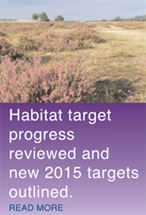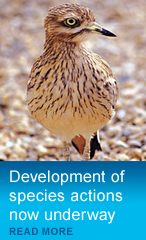Challenge 1: ‘Networking nature’
The Forum recognises that traditional conservation methods, often created small, isolated sites. To achieve a more connected landscape the Forum needs to harness local conservation activity to contribute to a strategic and holistic vision of the Region's natural environment. This objective will require functional linking of the Region's natural sites, hence 'Networking nature'.
The Forum has ensured its environmental opportunity map has been adopted at the regional level and appreciates it now needs to encourage local development frameworks to integrate 'networking nature' opportunities into their plans.
Click here to view the action plan pdf
Challenge 3: ‘Ensuring there is water’
A good supply of water is vital for the Region's most important inland habitats. However, the twin pressures of climate change and population growth mean it is becoming an ever scarcer resource. To ensure adequate supplies of clean water are available for both wildlife and people, the Forum advocates achieving the objectives of the European Water Framework Directive to improve the way rural land is managed; reduce the impact of transport and built environments on water quality; address localised
sources of pollution, so as to secure sustainable amounts of water and to improve wildlife habitats.
The Forum is also actively involved in helping to deliver the Wetland Vision for England. This Vision is a joint project between Natural England, the Environment Agency, English Heritage, The Wildlife Trusts and the RSPB and it sets out the mutual aspirations of these organisations for the conservation, restoration and creation of freshwater wetlands in England over the next 50 years.
Click here to view the action plan pdf
Click here to view all the Challenges
|



